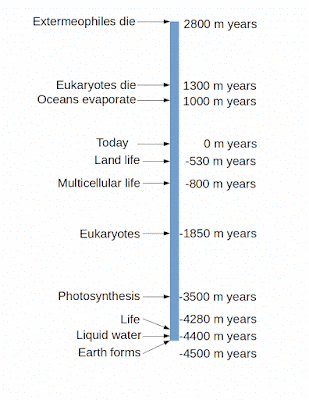The Drake Equation again
I was walking in to work today and as I did I was listening to a nice podcast on the Drake Equation. The Drake Equation is an estimate of the number of civilizations in the galaxy based on things like how many planets there are, how many develop life, etc. I learned a lot in the Podcast but it reminded me of a post I'd been meaning to make about why I think the origin of life probably wasn't the hard part in creating us. Also, I promise this post on the Drake Equation is more pleasant than the last one.
A graph:
A graph:
Dates taken from Wikipedia's timeline of life and timeline of the future.
It was just a pretty short amount of time, geologically, from when the Earth cooled down enough for oceans to start forming until we have proof of the first life - just 120 million years. And that's probably a conservative estimate. But from there it took three quarters of a billion years for photosynthesis to arise. Then one and a half billion until one bacteria swallowed another in such a way as to turn it into a mitochondria and then become a big complex eukaryotic cell. Then another billion before we had real multicellular life.
So just looking at the timelines involved it seems like the origin of life wasn't the hard part. If you're interested Nick Lane has some excellent books about the biochemical difficulties of these steps and why life might have been the easy part but for the Drake Equation the important part is that becoming complex took a long time.
And it's also important that life only had so much time to become complex because in just another billion years the brightening Sun will heat up our planet enough to evaporate the oceans and then there's not much chance of intelligent life evolving. And it's very lucky that photosynthesis showed up so early. If the Earth's carbon dioxide atmosphere hadn't been broken down into oxygen then Earth might have had a runaway greenhouse effect by now. And without oxygen in the atmosphere to form ozone we might have lost the hydrogen atoms we need for water to the Sun's solar wind.
Looking at that timeline makes me feel optimistic that the reason there don't seem to be any aliens in the galaxy is that evolving intelligent life is hard, rather than that intelligent life tends to meet a grisly end.


Nice article! What do you think about Bill Gates, Elon Musk, and some other people's concern about how dangerous AI could be to humanity?
ReplyDeleteI take them seriously but not quite enough so to be donating to MIRI or other organizations looking at the problem as opposed to Malaria eradication.
ReplyDeleteI did not know about this institute. Very interesting. Thanks for sharing!
ReplyDeleteGreat post, and I'm a fan of the rest of the blog as well. One suggestion - I'd have had a much easier time navigating through it if you'd had either a "best of" list, or else a better-formatted way to scroll through the entire archive.
ReplyDeleteFalse dichotomy. Evolving life is hard, and grisly ends are likely.
ReplyDelete